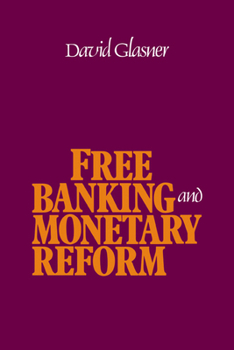Free Banking and Monetary Reform
Select Format
Select Condition 
Book Overview
The power of the state to issue currency and control the monetary system is so entrenched, and the presumption among economists that money must be supplied monopolistically by a central authority is so widespread, that the notion that money could be supplied competitively has rarely been taken seriously. This book boldly challenges the conventional view that the state must play a dominant role in the monetary system. Part I explores the historical evidence and examines how a well-developed monetary system might have developed without any special role for the state. Part II offers a theory for a competitive supply of money and uses it to shed light on the development of monetary theory and the course of monetary history over the past two centuries. In Part III the author outlines new proposals for monetary reform that will protect the financial system against instability and will ensure macroeconomic stability.
Format:Paperback
Language:English
ISBN:0521022517
ISBN13:9780521022514
Release Date:November 2005
Publisher:Cambridge University Press
Length:296 Pages
Weight:0.96 lbs.
Dimensions:0.7" x 6.0" x 9.0"
Customer Reviews
0 rating





